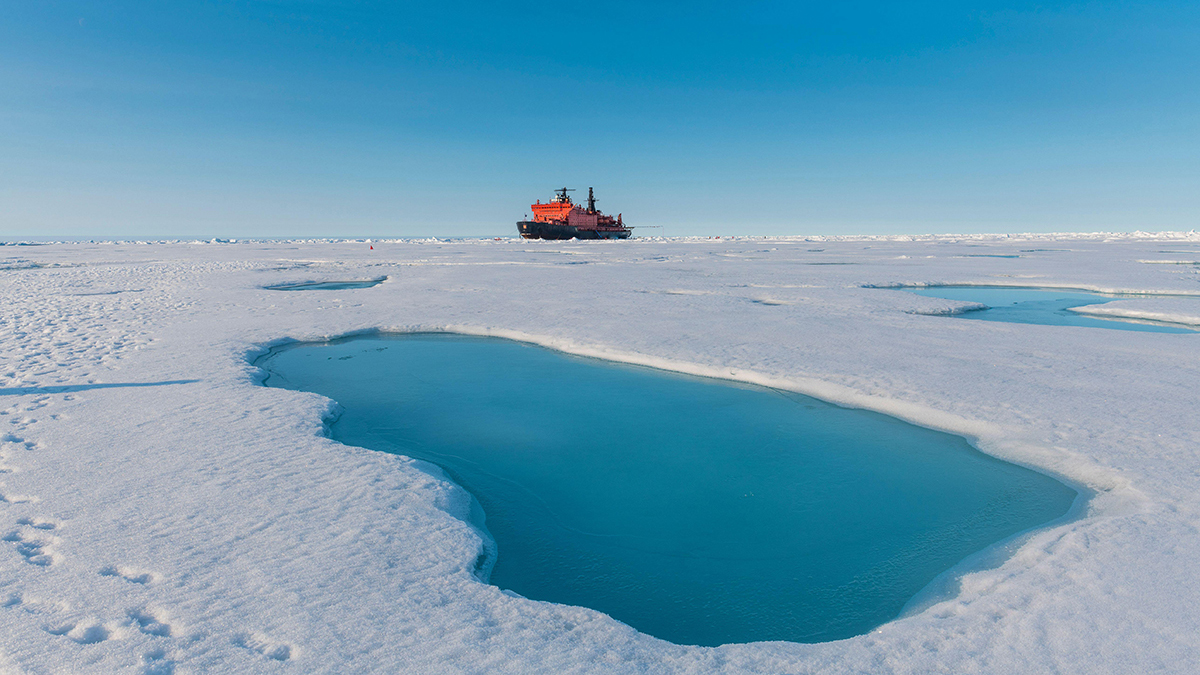Arctic Council overcomes challenge of suspended collaboration with Russia
‘The cryosphere has so far been left off the global climate agenda despite its immense impacts,’ Arctic Council chair, Morten Høglund, says
Norway’s chairship of the Arctic Council navigates geopolitics to address environmental issues
Morten Høglund faced the most challenging period in the Arctic Council’s history when Norway took over as chair of the intergovernmental forum in May 2023. Seven of the council’s member states had suspended collaboration with the eighth member – and outgoing chair – in March 2022, following Russia’s invasion of Ukraine.
The Arctic Council consists of eight Arctic states – Canada, Denmark, Finland, Iceland, Norway, Sweden, Russia and the US – and six indigenous permanent participants. The chairship of the council rotates between the states, with each holding the position for two years at a time. The council’s founding document – the Ottawa Declaration of 1996 – stipulates decisions require the consensus of all eight.
The question soon emerged from outside the council, therefore, what could the forum achieve without its largest geographical stakeholder? Russia covers 45% of the geographical Arctic, has waters that shipping routes rely on and produces climate data that research needs. The seven released a joint statement announcing the limited resumption of their participation in project-level work that did not involve Russia. The projects that resumed had been previously approved by all eight at the 2021 Reykjavik ministerial meeting.
“As climate change progresses, fire seasons are expected to become longer and more unpredictable”
Morten Høglund
Arctic Council
However, at the 13th meeting of the Arctic Council, transitioning the chairship from Russia to Norway, all eight Arctic states reaffirmed their commitment to safeguard and strengthen the council. Norway has since worked with all of them on finding ways to resume the council’s work especially at the level of its working groups.
In an interview with Insurance Day, Høglund stressed that it was always Norway’s intention to work with all eight Arctic states, including Russia.
He outlines how the interruption to political-level meetings has affected the council’s progress with its environmental goals. Notably, he says “decision-making has continued through written procedures”. These include Russian stakeholders.
“Over the past 12 months, the chairship has held regular consultations with all eight, hosted meetings with all six permanent participants and engaged extensively with the six working groups and the expert group on black carbon and methane to ensure work advances,” Høglund says.
“Maintaining this level of co-operation and co-ordination with all Arctic Council stakeholders has been a big achievement for Norway during this challenging time,” he continues, “and ensured some of the most urgent issues continued to be addressed through the working groups and through, for example, the Norwegian chairship’s wildland fires initiative.”
Strategic planning delayed
Nevertheless, Høglund admits some work, such as the implementation of the council’s 10-year strategic plan that was adopted in 2021, has been delayed and strategic planning has “not advanced at the usual pace”. The pause to official meetings has required working groups and their secretariats “to find new ways of operating”, he adds.
New guidelines in August 2023 enabled the working groups to resume their efforts to advance project activities. This included “written procedures”, such as proposing new projects, and collaborating with the council’s observers and external experts. In February this year, there began a gradual resumption of official working group meetings but in a virtual format. These virtual meetings have included Russia.
“Their ability to meet virtually is vital in advancing projects that respond to rapid climate change and tackle some of the most important and urgent challenges in the Arctic,” Høglund says. “From that perspective, the working groups aim to deliver on their projects at the end of this chairship cycle.”
The most recent report on the impacts of climate change by the Arctic Monitoring and Assessment Programme working group (Amap) is from 2021. It says the Arctic is warming faster than any other place on the planet and at least three times faster than the global average.
“The extension of sea-ice has been almost halved since 1978, with an area the size of India lost,” Høglund says. “There has also been a dramatic loss of land-fast ice, in particular from the Greenland ice sheet, which is another major source of the current sea level rise.”
The Amap report also describes the impact on societies in the Arctic, such as a reduced hunting season in Greenland owing to unstable sea-ice, and an increased frequency of wildfires, particularly in North America and Russia, that affects Arctic ecosystems and wildlife. Moreover, respiratory disease caused by soot particles are causing thousands of premature human deaths every year in the Arctic.
This year Amap is working on its latest update, which Høglund says is expected to be presented at the 14th meeting of the Arctic Council next spring.
Carbon and methane
According to the taskforce on short-lived climate forcers, air monitoring stations have detected a reduction in black carbon, but the opposite trend is true for methane, which comes mostly from oil and gas production. Høglund says existing legislation would “most probably” lead to a reduction in black carbon of 37% for Arctic states and 52% for Arctic Council observer states by 2050 on 2015 levels. For methane, Amap estimates a 13% increase for Arctic states and 25% for Arctic Council observer states by the same date.
Recent and ongoing work on black carbon includes an update to the Arctic Contaminants Action Program’s “studies platform” and a new Canadian Arctic community-based monitoring pilot project in Cambridge Bay.
Another project is the expert group on black carbon and methane’s task to develop a biennial summary of progress and recommendations based on the national reports it receives. The expert group’s latest report, from 2021, says the Arctic states were “on track” to reaching the collective goal of reducing black carbon emissions by 25% to 33% on 2013 levels by 2025, Høglund says. “Rising methane emissions, however, is a concern that needs to be addressed further,” he adds, and the expert group is working on its fourth summary report that will be delivered next spring.
Wildland fires are a growing and critical concern, with the summer of 2023 breaking new records for the circumpolar Arctic. Høglund says of the more than 1,000 active wildfires across Canada, 230 were in its northern territories. The council’s wildland fires initiative is an “important offering for our climate’s future”, Høglund says, “and aims to identify knowledge gaps and share best practices within and outside its network.”
He continues: “The start and end of a wildfire season is becoming increasingly difficult to pinpoint due to the extended duration of fire seasons and the occurrence of underground fires, known as zombie fires, which continue to burn even throughout the winter. These factors blur the traditional start and end dates, making it challenging to define a specific wildfire season. As climate change progresses, fire seasons are expected to become longer and more unpredictable.”
An electronic compendium of the council’s wildland fires projects will “make information more accessible, raise awareness and promote understanding of the issue from an Arctic and climate change perspective”, he adds.
Høglund hosted the International Conference on the Ecosystem Approach to Management in Arctic Large Marine Ecosystems, held in Tromsø, Norway in April. “A statement and more detailed report from the conference is being developed by the Arctic Council’s joint ecosystem approach expert group,” he says.
Cop29 plans
Høglund aims to bolster the council’s presence at Cop29 in Baku, Azerbaijan this November, having submitted its plan to hold a side event at the climate talks to the UN Framework Convention on Climate Change.
The focus of the planned side event is on the cryosphere – the Earth’s ice in all its forms – which Høglund says has “so far been left off the global climate agenda despite its immense impacts”.
He adds: “As chair of the Arctic Council, Norway is determined to bring this critical issue to the forefront, convening key actors and driving action.”
The session aims to highlight the changes indigenous peoples in the Arctic are “observing and navigating first-hand” and how their knowledge needs to be “equitably and ethically used” in response to these changes.
Also at Cop29, Amap plans to present the results of its upcoming climate report for 2024, giving the updated trends on the warming of the Arctic and its impacts on wildlife and human health.
“The Arctic Council and its working groups have hosted events at Cops since 2004 to bring Arctic issues to the global stage,” Høglund stresses.
One notable example is the presentation of the Arctic Climate Impact Assessment report at Cop10 in Rio de Janeiro. Høglund says: “This landmark assessment demonstrated how science and indigenous knowledge can combine to produce a comprehensive and globally influential report.”
Looking further ahead, Høglund expects the 1st International Arctic Emergency Management Conference, taking place on March 18-20 in Bodø, Norway – to be an “inclusive” event that takes a “holistic view” of the risks and hazards in the Arctic region.
It is unclear – and Høglund does not say – whether “inclusive” will include Russian representatives in person.



